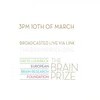Brain Prize winners 2013 - Six scientists honored with the world’s largest brain research prize.
The Brain Prize See all
Six eminent scientists share the world’s largest brain research prize
The Brain Prize - Denmark's 1 million euro brain research prize - is awarded to six leading scientists for the development of ‘optogenetics’, a revolutionary technique that advances our understanding of the brain and its disorders.
The names of the prize winners, Austrian Gero Miesenböck, Germans Ernst Bamberg, Peter Hegemann, and Georg Nagel, and Americans Ed Boyden and Karl Deisseroth, were announced on Monday 11 March 2013 in Copenhagen.
Together these scientists laid the foundations for a revolutionary technique - optogenetics - which will provide us with entirely new, fundamental knowledge of the complicated functions of the brain.
Optogenetics makes it easier to investigate diseases of the brain such as Parkinson's disease, Alzheimer's disease, epilepsy, pain disorders, schizophrenia, ADHD and addiction. It will play a significant role in the understanding of these disorders and, over time, in the development of a treatment for them.
The Brain Prize is awarded by the Grete Lundbeck European Brain Research Prize Foundation. British professor Colin Blakemore, chairman of the Foundation's selection committee, says:
“Optogenetic control of nerve cells is arguably the most important technical advance in neuroscience in the past 40 years. It offers a revolution in our understanding of the way in which circuits of neurons carry out complex functions, such as learning and controlling movement. And it could provide an entirely new approach to the restoration of function in blindness or brain degeneration, and to the treatment of a variety of other neurological and psychiatric disorders”
Breakthrough of the decade
Optogenetics, which has been called the breakthrough of the decade, involves the use of light to control neurons. Neurons can be genetically modified and made light-sensitive. Then, when these neurons are stimulated by specific wavelengths of light, they can be turned either on or off.
The four European scientists, Bamberg, Hegemann, Miesenböck and Nagel, made the fundamental observations and discoveries and developed light-sensitive molecules that can be introduced into specific types of neuron. The two Americans collaborated with the Europeans to develop the technique further and put it to work in living mammals.
The Brain Prize See all
The Brain Prize for 2014 is awarded to Stanislas Dehaene, Giacomo... |
The Grete Lundbeck European Brain Prize Ceremony 2013
In May 2013,... |
||||










































































































